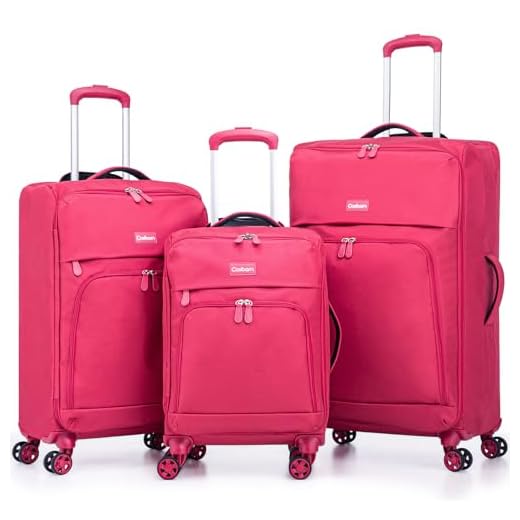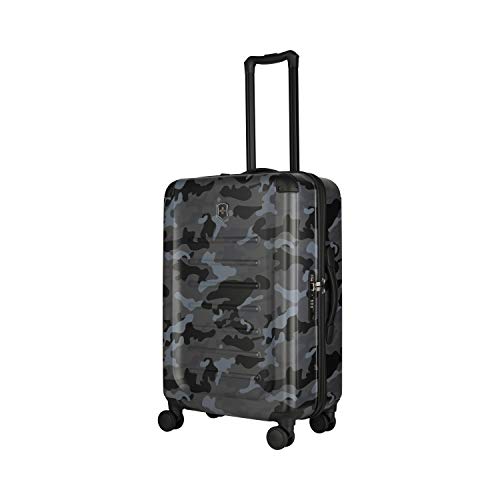



Prioritize size and weight restrictions imposed by airlines before making a purchase. Most carriers specify maximum dimensions for carry-ons and checked bags, often capping weight at 50 pounds for checked items. Double-check these limits on your airline’s website, as compliance can prevent additional fees.
Consider durability and material quality. Choose hard-shell options for enhanced protection against impacts, or lightweight fabric choices for easier maneuverability. Look for water-resistant fabrics, especially if frequently navigating varying climates.
Evaluate organizational features that suit your packing habits. Internal compartments, exterior pockets, and built-in TSA-approved locks can simplify the boarding process. A suitcase with 360-degree wheels enhances mobility, making it easier to navigate crowded terminals.
Review brand reputations and customer feedback for insights on longevity and performance. Investing in a reputable brand can often save money in the long run, as high-quality items tend to withstand wear and tear better than cheaper alternatives.
Tips for Selecting Suitable Baggage for Air Travel
Determine your packing needs before exploring options. Assess the duration of your trip, the types of items you’ll carry, and any special requirements for specific activities. This will guide you in choosing between hard-sided or soft-sided options.
Check weight specifications. Airlines impose strict limits on the weight of checked items and carry-ons. Look for pieces that are lightweight yet durable to maximize your packing capacity without exceeding limits.
Evaluate organizational features. Internal compartments, pockets, and dividers can make packing and accessing belongings simpler. Consider models with built-in organization systems for electronics, toiletries, and clothing.
Consider maneuverability. Choose cases with sturdy wheels and comfortable handles. Four-wheel spinners offer 360-degree mobility, making navigating through terminals more straightforward. Ensure the handle height suits your comfort level.
Inspect the security features. Look for lockable zippers and integrated TSA-approved locks for peace of mind. Some travelers prefer bags with tracking technology to locate their items in case of misplacement.
Review warranty options. Quality manufacturing should be backed by a solid guarantee. A robust warranty indicates the manufacturer’s confidence in their product and provides reassurance for long-term use.
Track user feedback. Research customer reviews focusing on durability, function, and any issues encountered over time. Insights from other travelers can highlight potential drawbacks or advantages you may not have considered.
Determine Your Travel Requirements and Luggage Size
Assess your itinerary. Identify the duration and type of your trip to understand the capacity you need. A weekend getaway may only require a small holdall, while an extended business trip could call for a larger suitcase.
Understand Airline Regulations
- Review the baggage allowances of your chosen airline: dimensions, weight limits, and number of pieces permitted.
- Check for specific rules regarding carry-ons and checked items, as these differ by carrier.
- Consider any added fees for oversized or extra items to make an informed decision.
Evaluate Packing Needs
- List the items you intend to take, taking into account clothing styles, footwear, and any special equipment.
- Factor in the necessity for a garment bag if carrying formal wear that requires special handling.
- Determine if you might bring back souvenirs or additional purchases that would need extra space.
Consider seasonal factors. For colder destinations, bulkier clothing will require additional space compared to lighter attire for tropical locations.
Think about the kind of travel you will undertake. If frequent transfers and mobility are involved, opt for lightweight options with wheels for effortless maneuvering.
Plan for accessibility. If you need to reach items quickly, a bag with multiple compartments is advantageous to maintain organization and ease of access.
Choose Between Hard-sided and Soft-sided Options
Opt for hard-sided variants if maximum protection for belongings is a priority. These cases serve as a barrier against impacts and provide better security against theft. They are ideal for fragile items, as their rigid exterior absorbs shocks efficiently. Consider that many hard-sided pieces are offered with features such as integrated locks and durable zippers, enhancing overall safety.
Advantages of Soft-sided Options
Soft-sided varieties afford flexibility and expansion. They often include exterior pockets for easy access to essentials and are generally lighter, making them easier to maneuver. Perfect for irregularly shaped items or last-minute additions, they can fit into overhead bins with greater ease due to their pliable nature. Keep in mind that these types are typically less robust against impact compared to their hard-sided counterparts.
Making Your Choice
Evaluate personal needs and preferences. If traveling frequently with delicate electronics or valuables, hard-shell cases may provide peace of mind. Alternatively, if versatility and lightweight convenience are essential, a soft model would be more suitable. For a practical option that combines durability and portability, consider the best foldable duffel bag for travel, which delivers functionality without sacrificing quality.
Evaluate Weight Restrictions and Durability
Prioritize the weight limits imposed by airlines, as exceeding them may incur hefty fees. Check both carry-on and checked baggage allowances, which can vary significantly between carriers. Aim for a suitcase that is lightweight yet robust. A weight-efficient design allows for more belongings without breaching airline guidelines.
Durability plays a critical role in ensuring your gear withstands the rigors of travel. Look for materials like polycarbonate or ballistic nylon, known for their resilience. Reinforced stitching and quality zippers enhance longevity, vital for frequent flyers. Consider investing in impact-resistant designs to prevent damage during handling.
Remember that your selection should balance weight and resilience. Lightweight options should not compromise structural integrity. Additionally, read reviews and consult resources for insights on popular models known for durability. For instance, while considering outdoor gear, something like the best umbrella for group shots can provide useful tips on choosing sturdy items that can withstand various environments.
Finally, check warranty information when purchasing, as this often reflects a manufacturer’s confidence in their product’s durability. A good warranty can save costs on repairs or replacements later. Assessing both weight limitations and construction quality will ensure you make a wise investment in your travel essentials.
Additionally, if you’re a pet owner and concerned about your furry friend’s safety at home, refer to tips on how to close gap in fence for dog for helpful guidance.
Assess Organizational Features and Compartments
Prioritize compartments that cater to your specific needs. Look for designs that include dedicated sections for electronics, toiletries, and clothing. These designated areas help keep items accessible and organized, minimizing search time during security checks or in the terminal.
Types of Organizational Features
Consider the following organizational features to improve your packing strategy:
| Feature | Description |
|---|---|
| Multiple Pockets | Enable easy storage of smaller items like chargers, tickets, or passports. |
| Expandable Compartments | Allow for additional space when needed, ideal for souvenirs or extra clothing. |
| Compression Straps | Create more room and keep packed items secure, minimizing shifting during transit. |
| Removable Dividers | Provide customizable organization, adapting to different packing styles or trip requirements. |
Specialized Compartments
Seek specialized sections catering to specific items:
- Electronics Sleeve: Offers cushioning for laptops and tablets, protecting them against damage.
- Shoe Compartments: Keeps footwear separated from clothing, ensuring cleanliness.
- Wet/Dry Areas: Ideal for toiletries, preventing leaks from spreading onto clothes.
Selecting a model with well-thought-out organizational features enhances the travel experience by maintaining order and accessibility. Evaluate your usual items and choose compartments that effectively accommodate them.
Consider Brand Reputation and Customer Reviews
Research reputable manufacturers known for quality craftsmanship and materials. Brands with a strong track record often offer reliable products, backed by warranties and solid customer service. Seek out labels that are consistently recommended by frequent flyers and travel enthusiasts.
Examine customer feedback on retail websites and dedicated review platforms. Look for patterns in comments concerning durability, functionality, and support. High ratings and positive testimonials can guide you towards a reliable choice, while negative reviews may highlight potential issues to avoid.
Pay attention to expert reviews and comparisons, which can provide insights into the performance of various options in real-world conditions. Articles from travel bloggers or industry publications often outline pros and cons effectively, helping to narrow down your selection.
Avoid purely cosmetic appeals; focus instead on user experiences regarding wear and tear, ease of handling, and practicality. Remember that word-of-mouth recommendations from seasoned travelers can also shed light on lesser-known brands that perform exceptionally well.
FAQ:
What should I consider first when choosing luggage for airport travel?
Begin by assessing your travel needs. Consider the length of your trips, the types of items you will be carrying, and the mode of transportation to and from the airport. For short trips, a carry-on might suffice, while longer journeys may require larger checked luggage. Think about how many compartments you need for organization and whether you’ll require space for travel documents, devices, or personal items.
How do I know if a suitcase meets airline size restrictions?
Airlines typically provide specific dimensions for carry-on and checked luggage on their websites. Measure your luggage carefully, including wheels and handles, to ensure it complies with these guidelines. Many brands even label their products with the dimensions and airline compatibility to help consumers. Checking these details beforehand can save you time and avoid potential fees at the airport.
What materials should I look for in durable luggage?
Durable luggage usually comes in materials such as polycarbonate, ballistic nylon, or high-denier polyester. Polycarbonate is known for its strength and lightweight nature, making it ideal for hard-shell suitcases. On the other hand, ballistic nylon offers excellent resistance to wear and tear, suitable for soft-sided bags. Evaluate each material based on your travel habits and the level of protection you require for your belongings.
Should I opt for hard-shell or soft-sided luggage?
Hard-shell luggage offers superior protection for fragile items and typically resists moisture better. It’s usually more lightweight and is easier to clean. Conversely, soft-sided luggage tends to be more flexible, allowing you to fit it into tight spaces and expand if needed. If you frequently travel with items like souvenirs, you might prefer soft-sided for its adjustability. Ultimately, the choice depends on your personal travel style and preferences.
How can I ensure my luggage is safe and secure during travel?
To enhance the security of your luggage, look for models equipped with built-in locks or accept third-party lock options. TSA-approved locks are also recommended, as they allow security personnel to unlock your bag if needed without damaging it. Additionally, consider using luggage tags with contact information and tracking devices for easy retrieval in case your bag goes missing. Investing in a durable suitcase can also deter theft due to its robust design.








